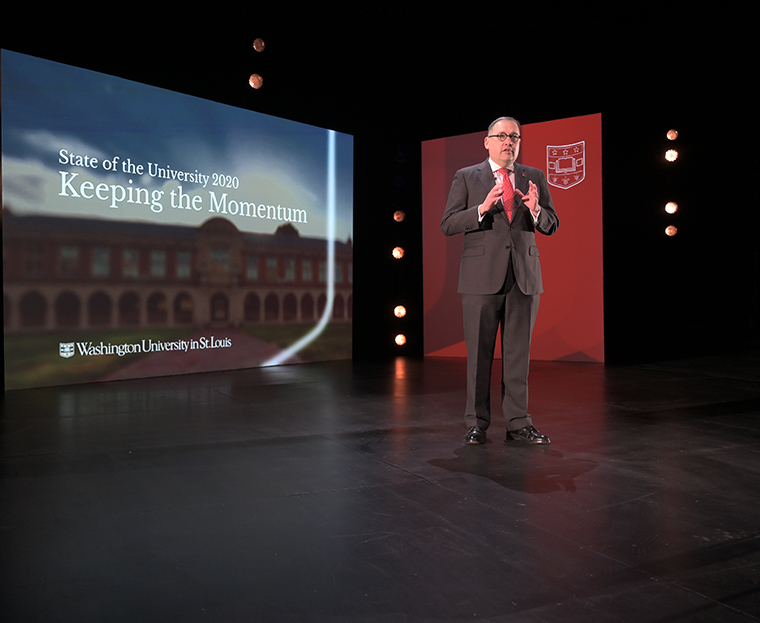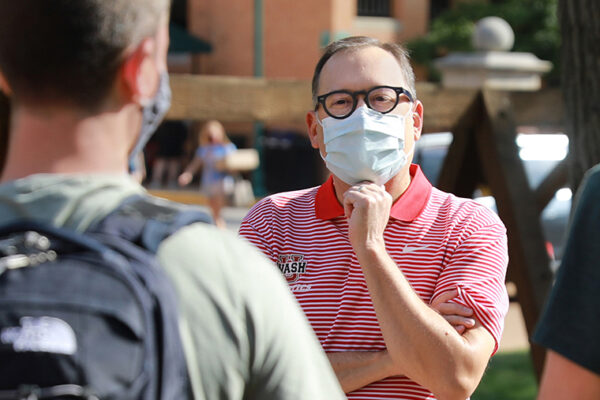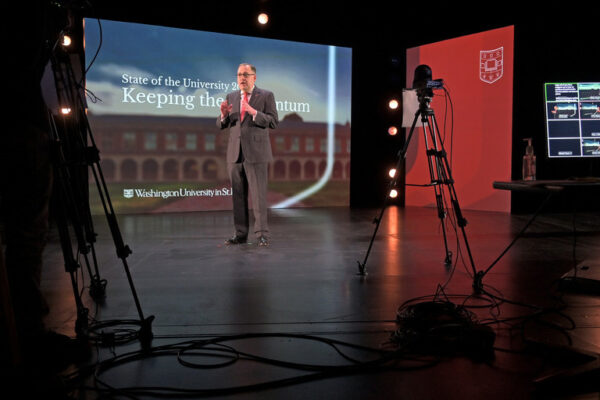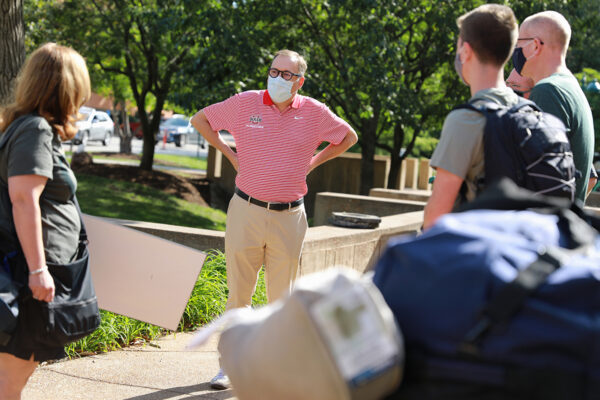Greetings from campus! Now almost a year into the pandemic, we have some good news to report. Here at Washington University, our Medical Campus colleagues have been vaccinated, and the public rollout continues locally and on a global scale. I’m also happy to report that throughout the pandemic we have continued to advance our mission in education, research and patient care.
On Feb. 16, 2021, I delivered my inaugural State of the University address to the entire Washington University community. In that address, I shared the ways in which we are keeping our WashU momentum despite the challenges we face as a community and throughout the region, the nation and the world. I’m thrilled that we are making progress on our commitments to academic distinction, educational access, and our role and impact “in St. Louis and for St. Louis.”
First, I’m immensely proud of the ways we have kept our momentum through medical research and compassionate patient care. The pandemic posed numerous challenges on our Medical Campus and health-care workers. But time and time again, our colleagues rose to the occasion, including navigating shortages in personal protective equipment, prepping for and working tirelessly through COVID-19 surges, developing a rapid COVID-19 saliva test, and creating and delivering therapeutic treatments to patients. Throughout, it has been clear that the faculty and staff on our Medical Campus truly embody our mission to improve lives, and I’m extraordinarily grateful for their leadership and service. Many of our alumni serve in roles in research and patient care around the globe, and specifically in this issue, we’re highlighting a cohort of Washington University alumni who have been working on an element of the vaccine at Pfizer here in Chesterfield, Mo.
I’m also pleased that, in the midst of the pandemic, we have kept our momentum by providing a world-class education. This past fall, our entire community — students, faculty and staff — adapted quickly to vast changes in the student experience, course delivery, and living and working conditions. While it certainly hasn’t been the academic year any of us imagined for our students, I am proud of their resilience, flexibility and the ways they pursued their passions and academic interests with equal amounts of rigor and dedication.
Andrew D. Martin
While our response to COVID-19 across all schools and units serves as a tangible example of our academic distinction and commitment to improving lives, our faculty members have also continued life-changing work in other areas. During my State of the University address, I also shared that last year our research revenue on the Danforth and Medical campuses was higher than anticipated — in fact, it was up $25.5 million from the previous fiscal year — for a total of $660.7 million. This is evidence that the pandemic has not altered our course.
Last June, I outlined a set of action steps to address issues of racial equity on our campus and beyond, and since then we have made positive inroads to address each of those steps. Some of them include the creation of an Equity and Inclusion Council, the hiring of 12 new faculty with a research emphasis on race, enhanced pedagogy and curricular programming, collaborative efforts to reimagine WUPD and campus safety, increased supplier diversity in contracting and construction projects, and more. Look for more about this important work and the newly launched Center for the Study of Race Ethnicity and Equity, which will promote research synergies across the university to inform policy and bolster the St. Louis region, in future editions of the magazine.
Finally, in terms of educational access, we have made a lot of progress. Pertaining to our incoming Class of 2024, 16% are Pell eligible, and 5% of the class is in the newly launched WashU Pledge program, which provides a free undergraduate education to full-time Missouri and southern Illinois students who are Pell eligible or from families with annual incomes of $75,000 or less. In addition, in the last year, we allocated nearly $7 million toward supporting students during the pandemic, including more than $4 million in additional aid to students whose financial circumstances had changed, as well as on technology grants, the crisis response fund and more. In this issue, the lead feature discusses access to education through the lens of first-generation students here at the university and discusses the importance with administrators who were also first-gen college students.
Although the pandemic has caused great upheaval, our momentum continues. And I look forward to seeing the gains we continue to make this year and beyond. Thank you, as always, for taking the time to learn more about our university initiatives, ones that are making a positive impact in St. Louis and throughout the world. I hope you enjoy this issue of Washington.



